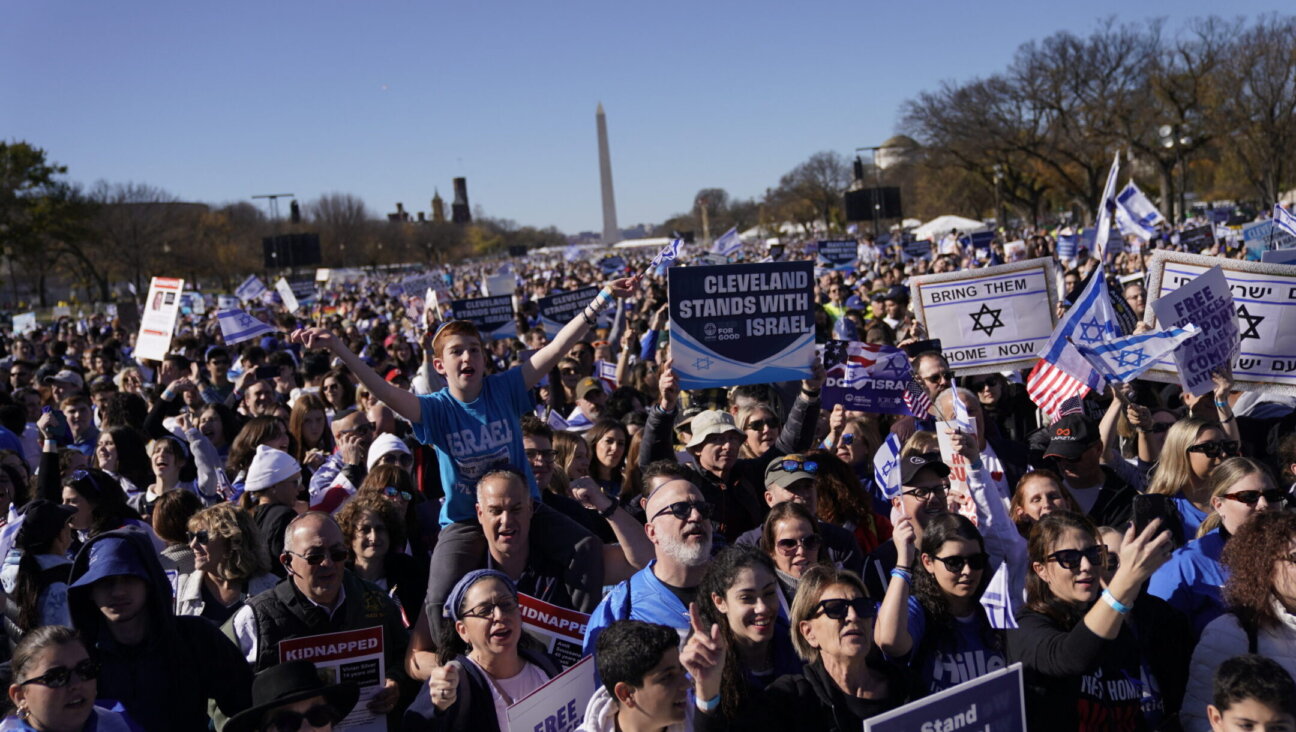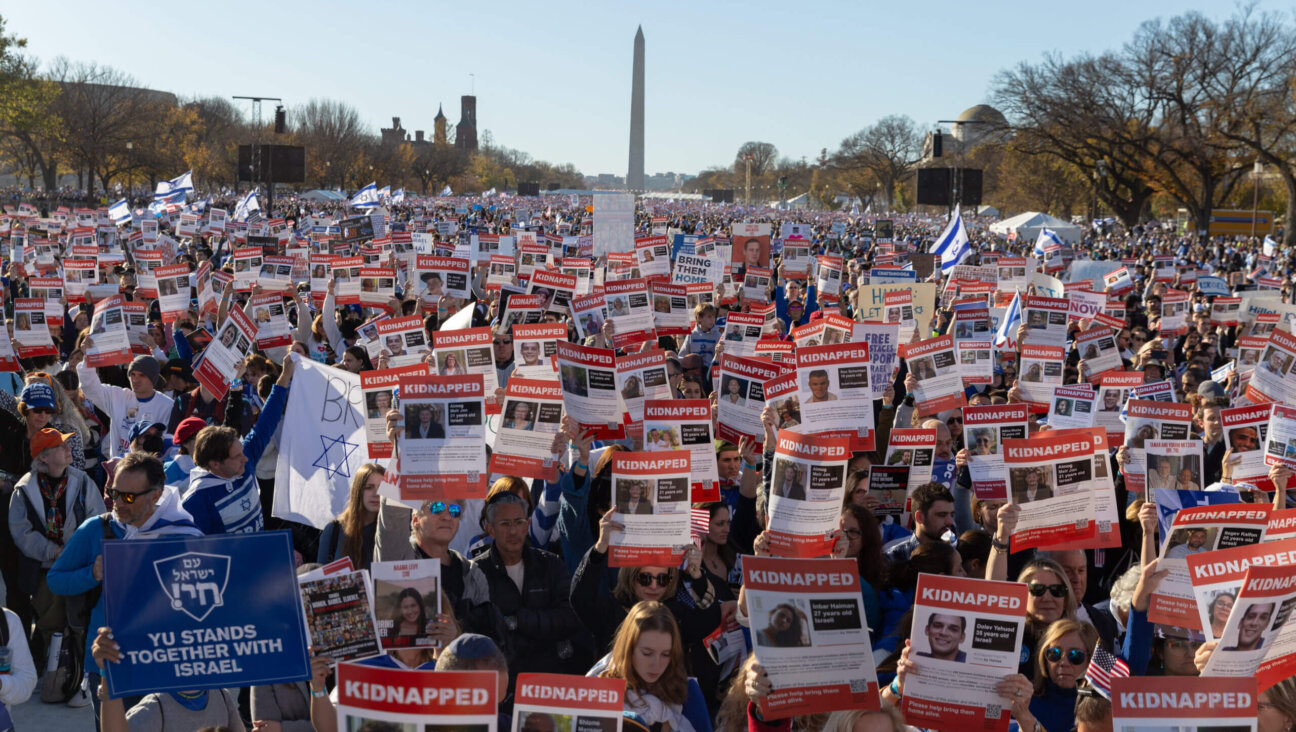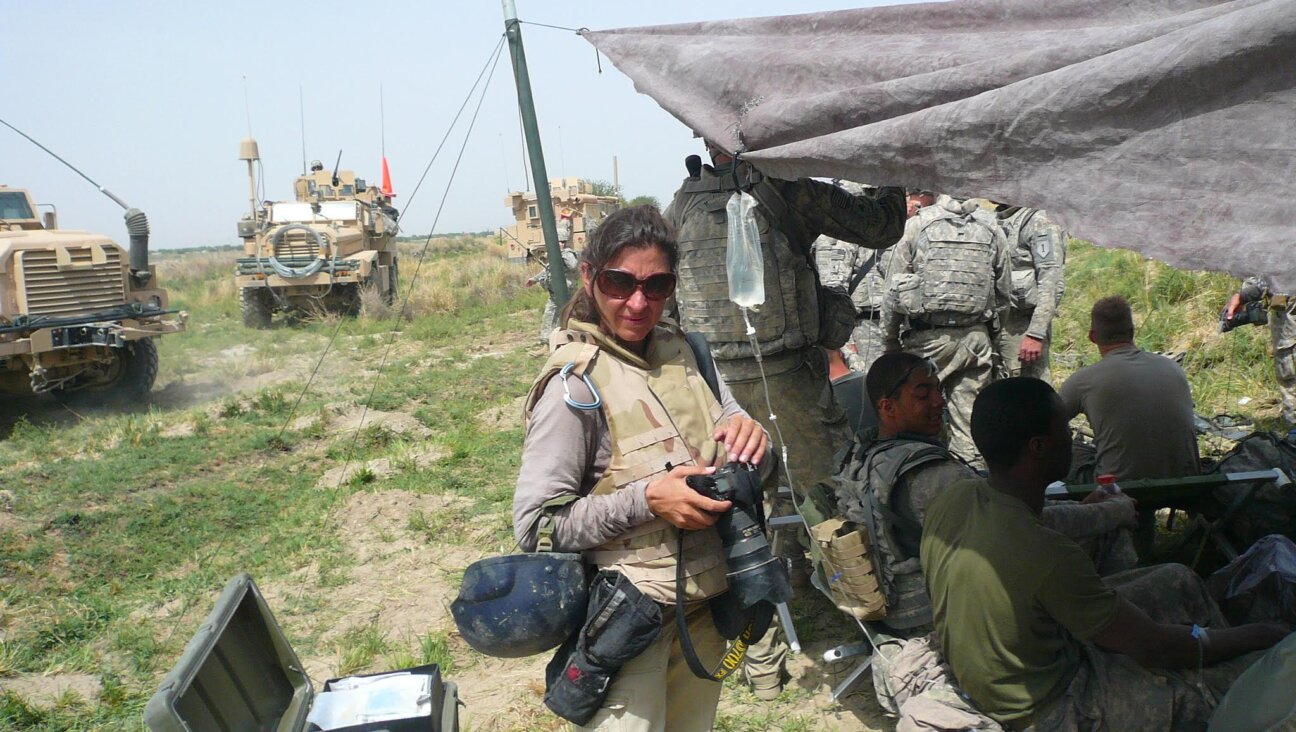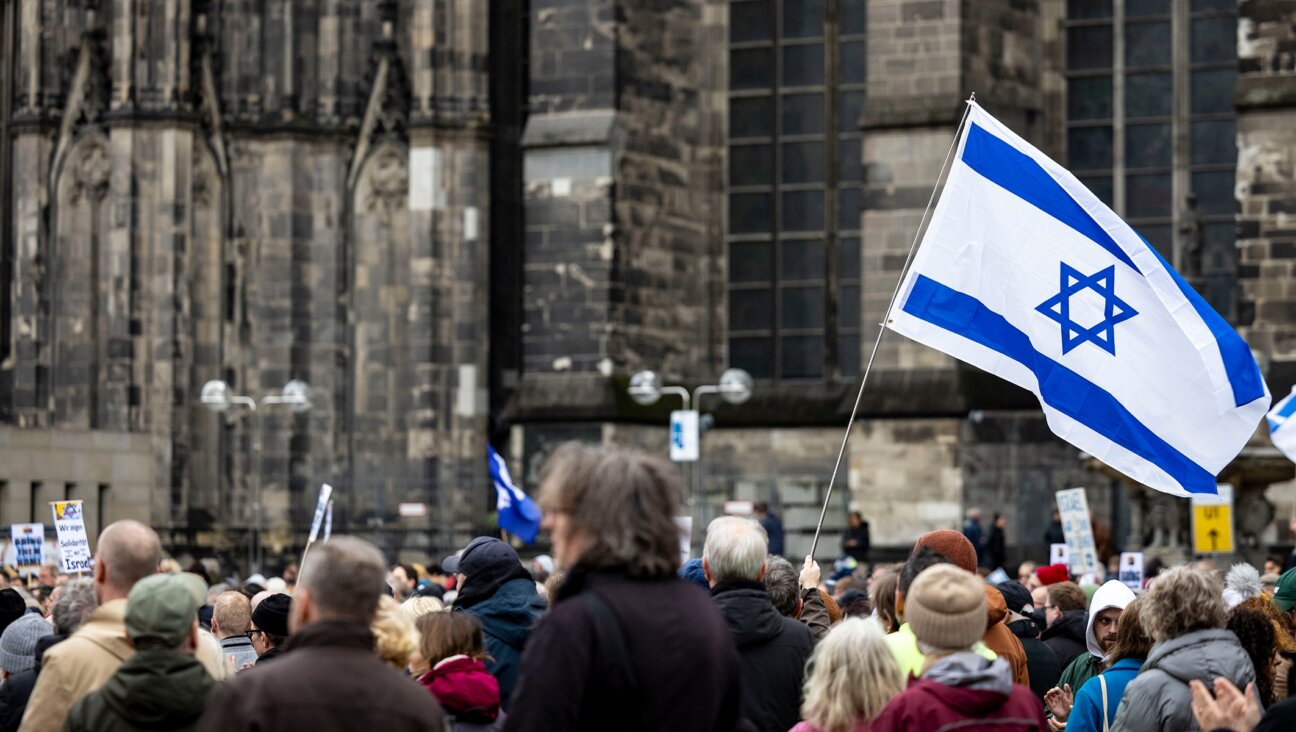At a Dead Sea hotel, refugees from Kibbutz Be’eri count their dead and grieve
A conference room in the hotel is divided by black curtains into several separate shiva areas for families. More are being held outside on the hotel lawn
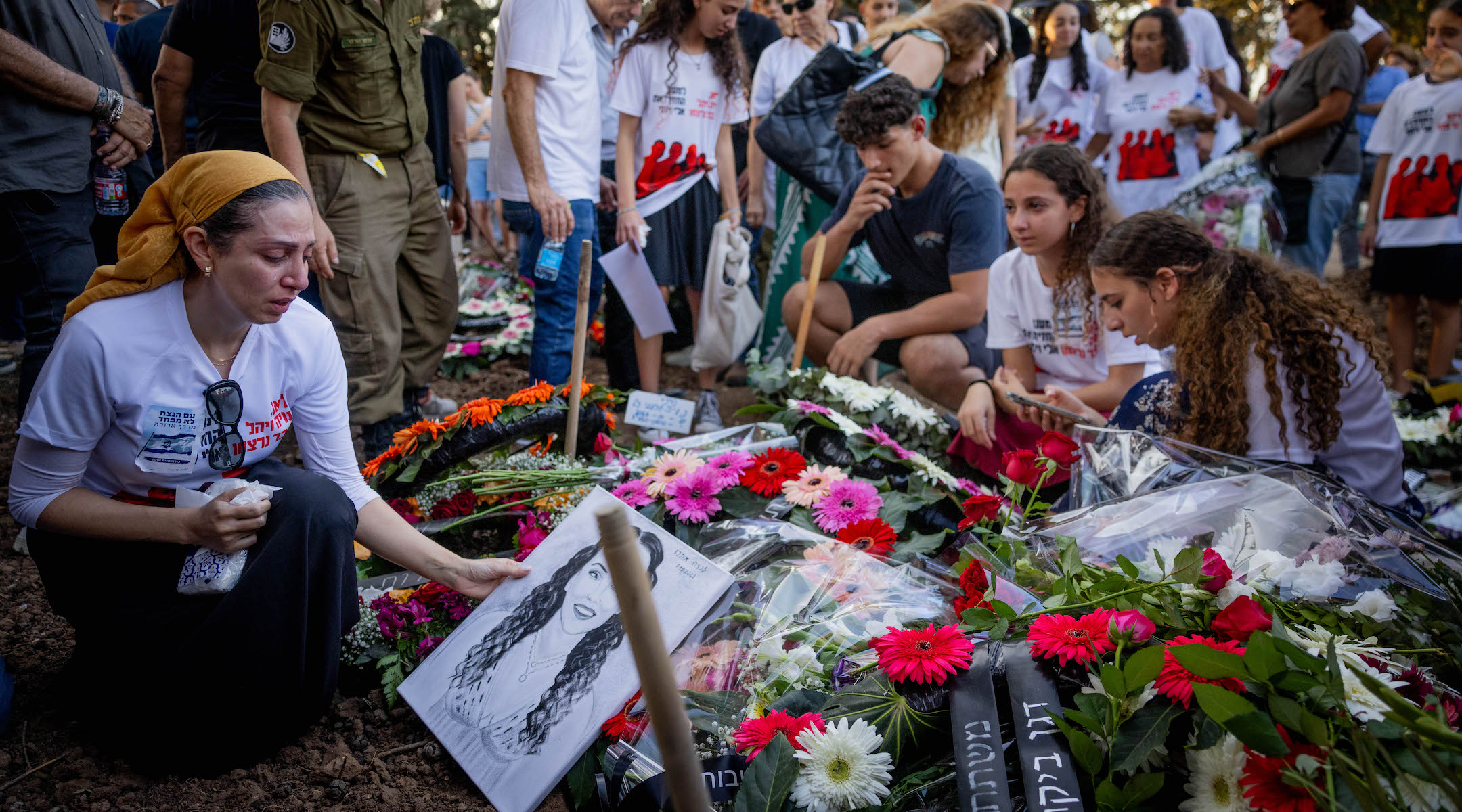
Family and friends attend the Oct. 25 funeral of three members of the Sharabi family, Lian, Noya and Yahel, who were murdered by Hamas terrorists in Kibbutz Be’eri on October 7, 2023. (Chaim Goldberg/Flash90)
DEAD SEA, Israel (JTA) — Nearly three weeks after Kibbutz Be’eri was massacred, its surviving members still gather for their community’s traditional evening meeting.
The kibbutz, ransacked and empty, is now a closed military zone. To those familiar with the litany of atrocities committed on Oct. 7, its name has become synonymous with some of the day’s worst horrors. Many of Be’eri’s residents refer to that day as a “Shoah,” or Holocaust.
Now, the nightly meetings instead take place at the David Dead Sea Resort, where most of Be’eri’s members are staying as Israel fights a war against Hamas, the terror group that invaded Be’eri and the rest of the Gaza border area, killing 1,400, wounding thousands and taking more than 200 people captive.
Instead of discussing the usual business of the community of about 1,100, Be’eri’s residents spend the meetings updating the list of kibbutz members who have been moved from “missing” or “kidnapped” to “dead.”
A conference room in the hotel is divided by black curtains into several separate shiva areas for families. More are being held outside on the hotel lawn.
Nineteen days after the massacre, the search and identification process for missing people is ongoing: The tally, which started at 20 dead out of 115 missing kibbutz members, has now grown to 85 dead and is likely to increase. Additional people who lived at Be’eri, but were not members of the kibbutz, were also killed, for a total death toll of more than 100.
Each of those statistics is an individual known on a first-name basis to members of the intimate, pastoral kibbutz, where cars do not enter beyond the gate and members’ main source of entertainment is each other.
“You read the list of the dead,” says Gal Cohen, who is 54 and has lived on the kibbutz his entire life. “These are people you grew up with and had countless experiences and interactions with.”
Cohen’s new routine consists of receiving updates regarding who in the kibbutz family is dead or captured. Alongside that, he spends his days attending funerals and shivas, all the while struggling to hold things together emotionally. That reality is typical of what Be’eri members are currently experiencing as the tight-knit community attempts to collectively process an unspeakable tragedy.
Describing one day, Cohen lists a series of funerals he and his family are attending, all of neighbors they knew personally.
“I was this morning at the funeral of a good friend, Hagi, who was in the civil defense patrol with me, a good friend who was murdered in the war to defend our home,” he said. “Now my daughters are at the funeral of Dana and Karmel. Avidan is left without a leg — they killed them in the bomb shelter.”
He continued, “They are doing the funeral closer to the center [of the country]. At 4, I need to go to a funeral ceremony that we are doing for Yoni, who was able to protect his children. He left the bomb shelter and hid them inside, where they were not found, and he was killed outside. … I am a strong person, but after five or six, you are broken.”
There are so many funerals and shivas, some far from the Dead Sea, that members cannot possibly attend them all.
“There was a day with 17 funerals, and you are not able to race to each one,” said Cohen. Shuttle services have been offered to help members pay their respects as much as possible. Some of the funerals are being thought of as temporary; families plan to rebury their loved ones on the kibbutz once the military allows them access.
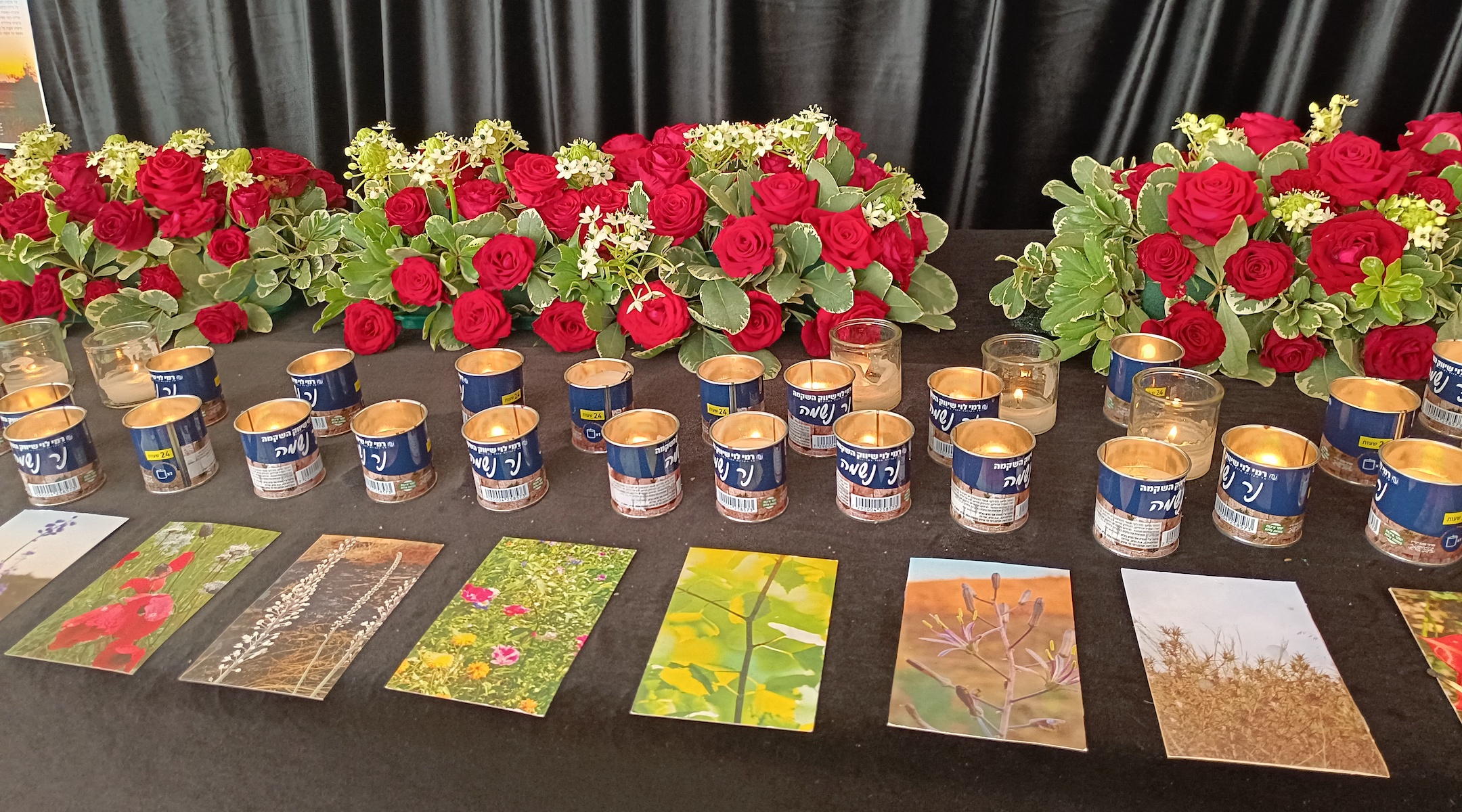
Rows of yizkor, or memorial, candles for the victims of Kibbutz Be’eri at the David Dead Sea Resort. (Eliyahu Freedman)
While their community’s grief is acute and ongoing — a reported 10 kibbutz members are being held captive in Gaza -— the kibbutz’s model of collective living is valuable to the healing process, says Dr. Nachum Halperin, 83. Halperin is the former head of the Israeli Orthopedic Society and has spent several days as a volunteer treating patients at the hotel who are exhibiting pain.
“Support from the community helps a lot,” he said. “The Be’eri community received a terrible blow. The fact that it is a united community helps a lot.”
Just down the road from the David Dead Sea Resort are other hotels housing Israeli refugees from southern cities like Sderot and Ashkelon. Halperin said that in some ways, they’re having a harder time.
“There are many new immigrants who speak their mother tongue of Russian, et cetera,” he said. “It seems like the trauma influenced them more.”
Regarding the Be’eri residents, he added, “The fact that there is a community here helps a lot.”
Halperin said comparisons to the 1973 Yom Kippur war — which happened exactly 50 years before Hamas’ attack and which is also a touchpoint of Israeli national trauma — are insufficient.
“This is much worse,” he said. “We learned how to deal with trauma — but we are not talking just about trauma but a Holocaust, something we were not ready for, that we did not understand.”
The unreadiness and unprecedented nature of Hamas’ attack has contributed to an Israeli mental health crisis, said Halperin. “In a situation like this, with stress and post-trauma, the bodily pains transform to be more painful because pain is not only in the knees, but it is gathered in the mind,” he said.
Inside the hotel, a makeshift team of government workers and volunteers offer their services and provide assistance. At a desk staffed by the Israeli Tax Authority, kibbutz members can receive help applying for special government assistance, while downstairs, a variety of holistic and psychological treatments are available for free.
In spite of the horrors of recent weeks, current and former kibbutz members, young and old, are coming together to start the process of rebuilding the community — stronger than before, they say.
“Every day we lose it and fall apart,” Cohen said. “But we are not falling apart for the sake of falling apart, but in order to build ourselves back up from the start. The goals are in front of our eyes and we will reach them.”
And some of the kibbutz meetings do lead to action items. Immediately after arriving at the hotel, the community drafted a list of goals. They are trying to transplant their unique way of life to a new setting, including allowing the kibbutz dogs to stay in the luxury hotel.
“When they evacuated me from the shelter under fire, my dog was the first to get in the Jeep,” Cohen said. “It was clear we were not going to leave her behind.”
At the top of the kibbutz’s agenda is freeing all of Israel’s hostages and rebuilding Be’eri at its original location.
“If Be’eri does not build itself back to succeed like it was before — in its location — I think that the State of Israel will shrink and be finished,” Cohen said.
Meanwhile, the kibbutz’s refugees grieve together. Outside on the lawn, surrounded by palm trees with a view of the Dead Sea, Moran Bar is sitting the second day of shiva for her parents, Yuval and Maayan, who were murdered on Oct. 7, but whose bodies were identified only 10 days later.
“We lived in a beautiful, complete, quiet Garden of Eden that they destroyed in a single moment,” she said. “There is something about being with the same people who experienced the same pain. It doesn’t provide comfort for the losses but it makes it a little nicer for the heart.”
This article originally appeared on JTA.org.






